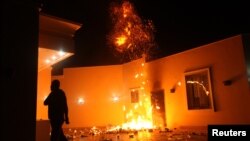THE PENTAGON —
The United States is expanding its military presence in Africa to counter the growing influence of al-Qaida in the Islamic Maghreb and other militant groups throughout North and West Africa.
U.S. concerns have been growing as militants have seized control of large parts of Mali and made their presence known across the region, through a campaign of bombings and other attacks from Nigeria to Libya.
Hitting closest to home for the United States was the killing of U.S. Ambassador to Libya Christopher Stevens and three other Americans in an attack on the U.S. consulate in Benghazi.
Secretary of Defense Leon Panetta recently confirmed it was the work of terrorists.
"The reason I think it pretty clearly was a terrorist attack is because a group of terrorists obviously conducted that attack on the consulate and against our individuals," he said. "What terrorists were involved, I think, still remains to be determined by the investigation."
Since the attack in Benghazi, the United States has dispatched Marine Corps rapid response teams to its embassies in Libya and Yemen.
Before the attack, the Pentagon had been working to expand its presence in North Africa by sending small teams of special operations forces and other personnel to help train and assist the militaries of several African nations that are trying to boost their ability to fight terrorists.
Defense Department officials are not confirming reports that suggest the commandos might have been dispatched to deal with specific threats to U.S. diplomatic personnel.
The American efforts highlight concerns that have been growing for years that al-Qaida and its affiliated groups, while under pressure elsewhere, have been expanding in Africa.
The U.S. Africa Command was set up during the administration of President George W. Bush and has been working to track the threat, dispatching teams to the continent to conduct reconnaissance, surveillance and training missions, including to the West African country of Mali. Command officials repeatedly have said they have no plans to build new permanent bases on the continent and that the teams they have dispatched are small in number.
At a press briefing this week, Pentagon spokesman George Little ruled out establishing a larger U.S. footprint in nations of the Economic Community of West African States (ECOWAS).
"With respect to what we're doing today, and what our focus is in Africa, there are no plans at this stage for unilateral U.S. military operations in Mali or in the region," said Little. "As always, we're paying very close attention to the situation in the region and stand ready should our partners in the region and regional actors such as ECOWAS request our assistance."
Little and other U.S. military officials are not disclosing details of the types of assistance that African partner nations have requested.
"With regard to a specific request, I wouldn't get into those in a public forum," he said. "I'm not prepared to make any announcements today, but we continue to assess their needs and, where possible and appropriate, we will work closely with our partners in the region."
The lack of specific information about the operations has fueled speculation among critics who question U.S. intentions in the region.
Ozzie Nelson, a counterterrorism specialist at the Center for Strategic and International Studies in Washington, says the lack of details may have to do with the role of U.S. forces acting in an advisory capacity.
“I’m not sure that it’s secretive as much as it is sensitive," said Nelson. "One of the core capabilities of special operations forces, and some components of the military, is to help train and equip indigenous or local forces. What we don’t want here is a U.S. face on any of these operations or these activities because, at the end of the day, we’re there in an advisory and training role. The face of these operations and the face of these activities have to be the local governments.”
According to analysts, the United States is trying to balance American interests — to smash terrorist groups on the territories of partner nations without giving people in these countries the impression that America is exerting too much influence on their governments — something analysts say could be a destabilizing factor.




